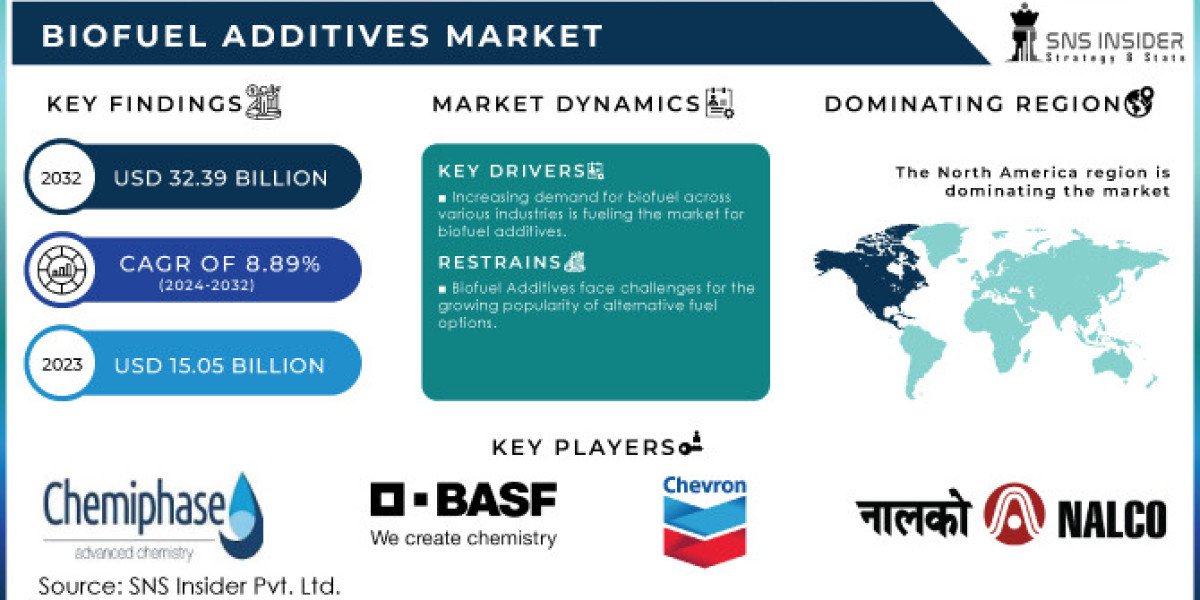The Biofuel Additives Market Size was valued at USD 15.05 billion in 2023 and is expected to reach USD 32.39 billion by 2032 and grow at a CAGR of 8.89% over the forecast period 2024-2032.
The biofuel additives market is expanding rapidly due to the increasing demand for cleaner, more sustainable fuel alternatives and the growing emphasis on reducing greenhouse gas emissions. Biofuels, derived from renewable sources such as plant oils, animal fats, and waste materials, are increasingly seen as a viable alternative to conventional fossil fuels. Biofuel additives are chemical compounds added to biofuels to improve performance, stability, and efficiency, as well as to optimize combustion processes and reduce emissions. These additives enhance the overall quality of biofuels and make them more compatible with existing engines and fuel systems. As governments worldwide impose stricter environmental regulations and consumers demand greener energy options, the biofuel additives market is set to experience significant growth.
Key Players in the Biofuel Additives Market:
Evonik Industries AG – A leading chemical company providing high-performance additives to improve biofuel quality and performance.
BASF SE – A global leader in the chemicals industry, offering biofuel additives that enhance fuel stability and combustion efficiency.
Clariant AG – Known for producing sustainable biofuel additives that improve engine performance and emissions control.
Innospec Inc. – Specializes in the development of biofuel additives that reduce emissions and enhance fuel efficiency for the transportation sector.
Chevron Corporation – A major energy company offering biofuel additives as part of its broader portfolio of sustainable fuel solutions.
Renewable Energy Group, Inc. – A key player in the biofuel industry, providing biofuel additives to optimize performance and ensure regulatory compliance.
Chemtura Corporation (LANXESS) – Develops advanced chemical solutions, including biofuel additives that improve fuel stability and combustion processes.
Future Scope:
The future of the biofuel additives market looks promising, driven by the increasing global push for renewable energy sources and reduced carbon emissions. With governments setting more aggressive renewable energy targets and the shift toward biofuels in sectors like transportation and industrial processes, the demand for biofuels and their additives is expected to rise. The market will continue to grow as biofuels play a critical role in meeting sustainability goals, especially in the context of the transportation sector, where there is increasing demand for fuels that reduce dependency on fossil fuels. Additionally, advances in biofuel production technologies, such as second and third-generation biofuels (e.g., algae-based biofuels), will likely create new opportunities for biofuel additives. As biofuels become more mainstream, the development of specialized additives to improve fuel efficiency, engine performance, and emissions standards will be key drivers for market growth.
Emerging Trends:
The biofuel additives market is seeing several emerging trends that are shaping the future of the industry. One key trend is the development of advanced, multi-functional additives that not only improve fuel performance but also enhance the environmental benefits of biofuels. These additives are designed to increase fuel efficiency, reduce particulate emissions, and enhance the stability of biofuels under different environmental conditions. Another emerging trend is the growing focus on the use of biofuel additives in the aviation and marine sectors, as these industries look for cleaner alternatives to traditional fuels. Additionally, the growing emphasis on sustainability is driving the demand for biofuel additives derived from renewable and bio-based sources, aligning with the broader goals of the circular economy. The rise of electric vehicles (EVs) and hybrid technologies may also influence the demand for biofuel additives, as they will continue to coexist with biofuels in the broader energy transition.
Key Points:
The biofuel additives market is driven by the global demand for cleaner, renewable energy sources and stricter environmental regulations.
Key players include Evonik Industries, BASF SE, Clariant AG, Innospec Inc., Chevron Corporation, Renewable Energy Group, and Chemtura Corporation.
Future growth in the market is fueled by the increasing adoption of biofuels in transportation and industrial sectors, with a focus on improving fuel efficiency and reducing emissions.
Emerging trends include the development of multi-functional additives that enhance both fuel performance and environmental benefits, as well as the use of biofuel additives in aviation and marine industries.
Biofuel additives derived from renewable, bio-based sources are gaining traction as part of the broader push for sustainability and the circular economy.
Conclusion:
The biofuel additives market is poised for significant growth as global demand for cleaner, more sustainable fuel alternatives continues to rise. As biofuels play an increasingly critical role in reducing greenhouse gas emissions and meeting renewable energy targets, the need for high-quality additives to optimize performance, fuel efficiency, and emissions control will drive market expansion. Key players in the industry are developing innovative additives to meet the evolving needs of the biofuel market, particularly in sectors like transportation, aviation, and marine. With sustainability at the forefront, the biofuel additives market will continue to benefit from the push toward more sustainable fuel solutions. Companies that focus on innovation, efficiency, and regulatory compliance will be well-positioned to lead in this rapidly evolving market.
Contact Us:
Jagney Dave — Vice President of Client Engagement
Phone: +1–315 636 4242 (US) | +44- 20 3290 5010 (UK)









